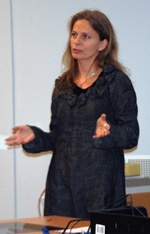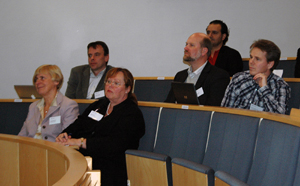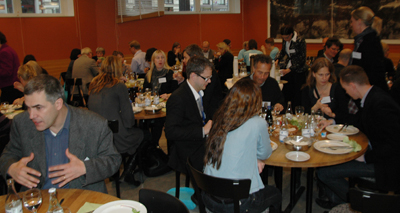
Diversity in retail and wholesale research
There is no doubt about that the research in the field of retail and wholesale is widespread and covers a lot of subjects in the Nordic countries. At the second Nordic Retail Wholesale and Conference research results and works-in-progress were presented and researchers took the chance to talk with colleagues about current topics to learn more.
About a hundred researchers from Sweden, Denmark, Norway and Finland participated in the Nordic Retail and Wholesale Conference, NRWC, in Gothenburg in November 2010. Everything from logistics and packaging design to e-commerce and branding was presented at the conference. In the sessions where the researchers presented their research papers the discussions were lively and fruitful.
Trust is crucial
Nina Mesiranta, from the University of Tampere, talked about how people in Finland versus Sweden, Germany and the UK shop on the net compared to how well connected they are to the Internet.
– It’s evident that although the preconditions in Finland are excellent they are making less purchases online than for example Germans who are not so well connected, said Nina.
The Finnish consumer expressed concerns about the security and privacy while shopping online.
For e-commerce to work it is also important that the customers know that their goods will be delivered on time. Johan Hagberg, University of Gothenburg, presented research on different supply chains for e-commerce:
– We have identified six supply chain alternatives, and the requirements for the information system in each case, in a study with a multi organizational approach.
Trust is also an issue on Tradera, on which Cecilia Fredriksson’s, Lund University, ethnographical ongoing research focuses. One of the golden rules to follow is to use secure payment services, something the buyers and sellers quite often disregard though.

A matter of reliance is furthermore built in to the new practice of selling pharmaceuticals in ordinary retail stores in Sweden. The retailers are responsible for taking care of the products and offer them in a safe way.
– In the case-store we’re studying the retailer had decided to put the pharmaceuticals in an open shelf nearby the cashiers for supervision, said Petra Adolfsson, University of Gothenburg, as a service to the customer rather than putting them behind the cashiers.
Unhappy consumers
Customers that are unfriendly and sometimes get really angry and aggressive are part of the retail staffs everyday work life, the most common one being verbally abused. This can be triggered by many different things shows the study presented by Nicklas Salomonson, University of Borås:
– A new finding in our study is that company routines and rules can trigger customers to behave badly and that the staff sometimes alters the offer to reduce potential misbehavior.

Another thing that can make the customers unhappy is scandals about products being produced in really bad conditions. One way of trying to put an end to this is to use private regulations, but research shows that they are ineffective.
– There are indications that private regulations might work when grassroots unions and Non Governmental Organizations work together, said Nicklas Zandén, University of Gothenburg, but we don’t know how they do it. We’re studying Indonesian unions to find out more about this.
Philosophers and carsons
In an unusual study Lars Esbjerg, Aarhus University, applied the ideas of the German philosopher Martin Heidegger to a study of how German food retailers buy pork. According to Heidegger we are fused with the world and we usually act according to what we believe one is supposed to do in a certain situation, but it would be better if we thought more freely.
– The buyers of pork are constantly making choices and by using Heidegger we can argue that they should think more critically and also in the long run that research not should offer “easy” solutions, concludes Lars.
According to Daniel Normark, University of Gothenburg, the petrol stations are full of carsons, meaning persons that are fused with their cars. There’s an ongoing surturing of the sundered carson who has left it’s car to for example pay for the petrol.
– This is an important pluralistic take on agency which becomes co-agency where humans and technologies coexist.
Looking and touching
One of the findings in Bertil Hultén’s, Linneaus University, study of multi-sensory marketing is that a customer who touches a product is more likely to buy it and the more the customer touches it the more likely the purchase becomes. The experiment also showed that adding some atmospherics such as nice smells and reduced lighting makes the customer’s touching-time longer and thus increases sales.

The importance of the visuals of products are shown in a study about packaging placement versus packaging design that Poja Shams, Karlstads University, presented too. When customers in an experiment were asked to look for either the budget alterative or the luxurious products in a shelf their eyes were drawn to the fancy packages.
– We were able to show that the way the product looked was more important than the placing.
NRWC 2012
In the plurality of research that was presented at the conference there is something for everyone in the retail business, whether you are interested in how to make the conditions for the producers better, get the best possibly supply chain, sell more with smell and visuals or find out about how people shop online in different countries.
The next Nordic Retail and Wholesale Conference, NRWC 2012, will be held in Lund. Be sure to check out this homepage to learn more as the conference draws nearer, and participate in the furthering of academic research in the field of retail and wholesale.

In between the session the researcers had time to discuss and exchange ideas and experiences.

SaveSave